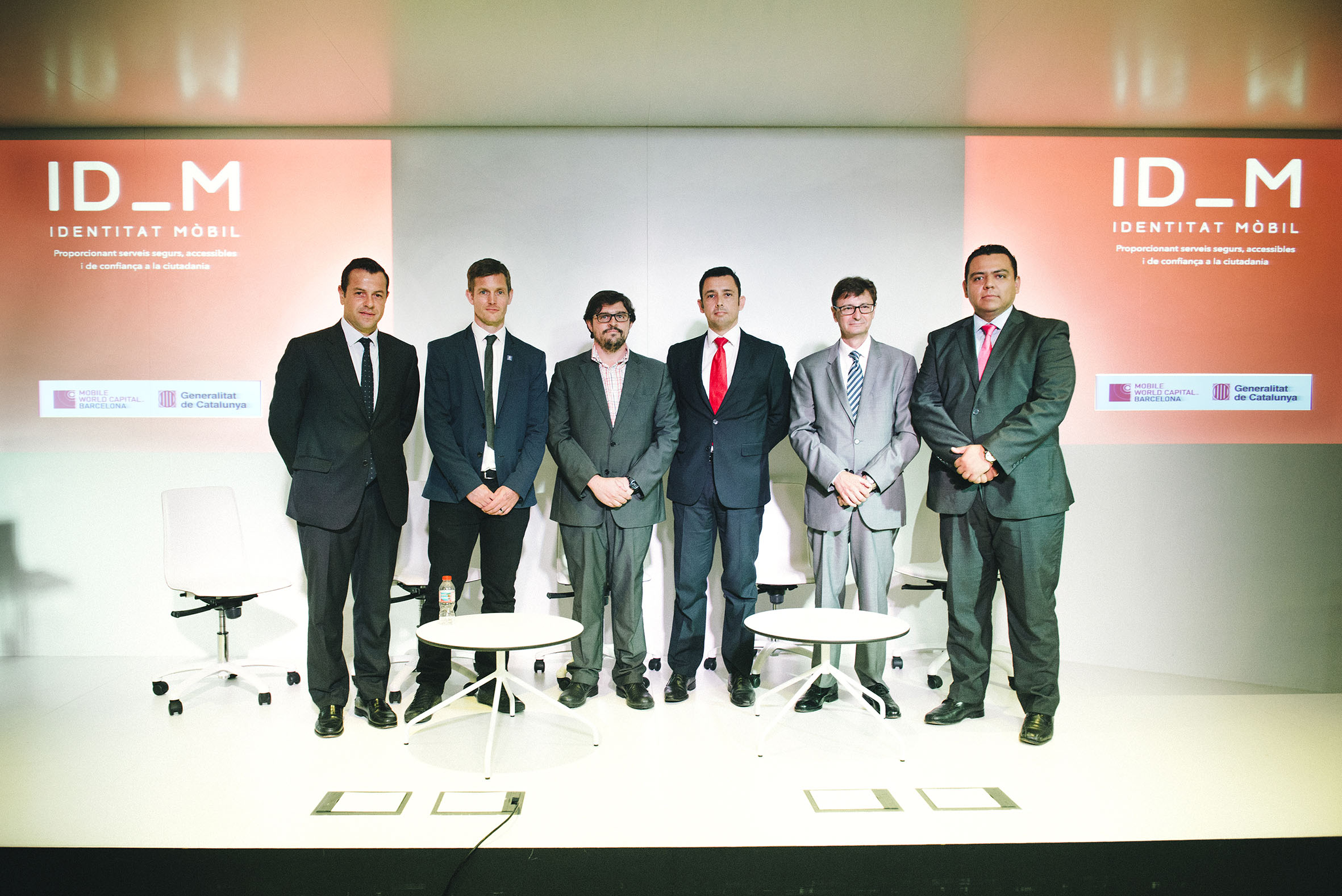
- MWCB, the Government of Catalunya and GSMA will launch a pilot project involving mobile identity authentication between two European governments: those of Finland and Catalonia
- A study carried out by MWCB stresses that the keys for the development of mobile identity solutions are improved privacy, security and data control
- Mobile identity services will allow governments to offer a new model for their relationships with citizens and to promote new electronic services

July 23, 2015
Mobile World Capital Barcelona, the Direcció General de Telecomunicacions i Societat de la Informació de la Generalitat de Catalunya (DGTSI), and GSMA present a new collaboration agreement to promote pilot projects in the field of mobile identity in Catalonia. The aim of these tests is to develop digital services that can be managed via mobile telephones and improve relationships between government authorities and citizens, and that are also applicable to the private sector, to improve transactions between companies and their clients.
The initiative arose in response to public demand to channel traditionally analogical services – like filing paperwork with the city, accessing one’s personal health file, electronic signing of documents, and electronic transactions – to adapt these processes to the digital needs of society today. This requirement entails more and better digital services, and, above all, greater levels of security, privacy,y and trust to contract and use these new solutions via mobiles.
In order to delve deeper into the role of smart citizens, evaluate how they can establish a fluid relationship with government authorities, and define how they can contribute to city governance, Mobile World Capital Barcelona has drafted a report, ID_M, Mobile Identity, in collaboration with GSMA, Accenture, NXP, and T-Systems.
The study, also presented this morning, analyses smartphones’ potential as new identification tools that are totally safe, reliable, and private, as well as providing recommendations for their potential implementation in Catalonia. The report illustrates the new role of smartphones resulting from the expansion in their functions, which establishes them as a real and essential nexus between our physical identity – ID card, credit card, health system card, membership cards, etc. – and our digital identity – profiles on social networks, email accounts, online banking profiles, etc.
On hand for the presentation were Jordi Puigneró, General Director of Telecommunications and the Information Society at the Department of Business and Employment of the Regional Government of Catalonia; Richard Cockle, Director of GSMA’s Personal Data Programme; and Oscar Pallarols, Director of Mobile World Capital Barcelona’s Smart Living Programme. A round table discussion has also been celebrated with the participation of Richard Cockle, Director of GSMA’s Personal Data Programme, Nacho Alamillo, director of ASTREA, Pedro Martínez, director of Business Development, EMEA of NXP, Luis Enrique Oliveri, Security and Risk Senior Manager of Accenture i Eduard Contijoch, Mobile Solutions Director a T-Systems.
The mobile as an identity tool: the key to promoting the development of digital services
The ID_M, Mobile Identity report contains a set of recommendations to meet the public’s demand for mobile services and to facilitate the rendering of electronic services by public and private institutions.
Firstly, MWCB recommends the creation of a digital census of the population, including data like email addresses and mobile phone numbers. This digitalisation of the census, pending citizen consent, will make it possible to create a digital platform for the validation of credentials, which will establish the government as the certifying entity for all an individual’s identities vis-a-vis any third party. Nowadays passports are globally recognised as a valid form of identification between countries, but in the future credential verification will be carried out via mobile by means of the new confirmation tool. The creation of this digital census requires alliances between agents in different private sector areas, like banking and telephone service operators, so as to forge alliances for the initial gathering of data and the acceptance of the service for all types of transactions in the private sphere (like contracting services, changing personal information, etc.).
At the same time, MWCB suggests expanding the scope of action of mobile identity solutions in order to establish it as a cross-disciplinary platform to access all types of services. Thus, for example, the mobile will function as a smart card allowing access to buildings or restricted areas by means of an NFC reader and will contain the user’s credentials for the signing of documents via mobile. In the short term, phones will also function as tickets on public transport, in the framework of projects like T-Mobilitat, and will make it possible for citizens to access their personal health information, as demonstrated by the Personal Health File pilot programme backed by MWCB and the Regional Government of Catalonia’s Department of Health, an initiative that is already underway. In this way, the smartphone shall become the default device for the accreditation of citizens and clients, in a way that is secure and reliable and features an easier and simpler user experience than other certification processes, like passwords and grid cards.
The smartphone’s development as an authentication device will also be key for online shopping and e-banking. In these areas, the sending of an SMS to the client’s phone has already become a common practice, as has verification by means of fingerprints to authorise operations. This diversity of identity validation technologies and solutions illustrates the need to build consensus for agreement upon a cross-disciplinary, universal model for all types of services that require safe and trustworthy access. Along this line, the report also proposes the adoption of a standard service that is interoperable and secure for citizen authentication to access all types of digital services, like the Mobile Connect system backed by GSMA. This service will be applied in concert with other existing solutions, such as Val-ID, the identity validation service of the Consorci de l’ Administració Oberta de Catalunya (AOC), and mobileID, which makes possible authentication to access the City of Barcelona’s electronic administration services.
As part of this proposal Mobile World Capital Barcelona, DGTSI, and GSMA are working on a pilot project involving mobile identity authentication between two European governments by means of the Mobile Connect system. This initiative, subject to the eIDAS European regulation governing electronic identification and trustworthy services for the execution of electronic transactions in Europe, will feature cooperation by the governments of Finland and Catalonia. The programme will be based on the authentication of a Finnish citizen when he accesses an online system of the Regional Government of Catalonia; and vice versa, with a Spanish citizen accessing a Finnish public agency through Mobile Connect.
Towards a new model
The report highlights the widespread culture of service digitalisation existing in Catalonia and its efforts to resemble international leaders like Estonia, which boasts the world’s broadest offering of mobile identity services; Finland, with a pioneering, interoperable service that is backed by operators; and Switzerland, which prioritises the user’s experience in this sector.
In order to foster the creation of a unique model making it possible to develop all Catalonia’s potential, MWCB, the Regional Government of Catalonia, and GSMA will cooperate to face the structural challenges posed by the implementation of these types of solutions. The ID_M, Mobile Identity study views the standardisation of different technologies (NFC, Bluetooth, and readers of biometric features, among others), as an essential element to render possible the widespread use of these mobile identity services. This also requires to standardise the devices on the market and to generate solutions that are compatible with all of them.
Finally, MWCB points out the need to revise the current regulatory framework concerning levels of data protection, privacy, and property, and calls for the creation of associated business models allowing the private sector to adopt mobile identity solutions.
Stay up to date about everything
Subscribe to stay up to date with the latest content from Mobile World Capital Barcelona.